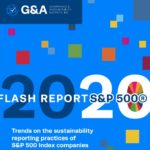Despite its softly, softly image, the social responsibility campaigners have come down hard on their first batch of rejects, says Roger Cowe.
The first companies were ejected from the FTSE4Good ‘ethical’ stock market indices last week after environmental criteria were tightened, and many others
were warned that they will have to do better if they want to stay in after the next review in six months’ time.
This moment of truth followed the publication of the first Responsibility Index, which left chairmen of companies such as Reuters, WH Smith and RMC fuming after they were relegated to the lowest of five divisions, or quintiles.
Three UK companies have been kicked out by the FTSE4Good committee: the printer St Ives, financial software house RoyalBlue, and Goldshield, which sells vitamins and other food supplements such as Evening Primrose Oil and Flexeze. Elan, the troubled Irish pharmaceutical firm was also evicted from the indices.
The expulsions are a consequence of the policy to steadily raise the standards required for inclusion. FTSE4Good, whose indices are used by socially responsible investors, including a Direct Line unit trust, announced last March that companies would have to meet tougher environmental standards – and would have a year in which to meet the new threshold.
To stay in the index, companies in what are seen as high-impact sectors, such as oil, chemicals, supermarkets, food and drink, are expected to have comprehensive environmental policies and management systems, and report publicly on their performance. The requirements are lower for companies in sectors with lower environmental impacts. IT and telecoms companies, for example, only need to have a public policy.
About a quarter of the 300 companies in the UK index don’t meet these new standards. But the index group’s corporate responsibility staff have been working with them over the past year and reckon that most are on the way. Only the four companies already mentioned have said they won’t toe the line, so now they are out of the index, along with one Norwegian and two US firms. Meanwhile 13 new UK companies have met the criteria and joined the index for the first time.
Leniency for those who have failed to meet the deadline is part of FTSE4Good’s softly, softly approach. ‘We have taken the view that it’s better to give them more time if they are committed to moving forward,’ explains Craig Mackenzie, head of investor responsibility at Insight Investment and a member of the FTSE4Good committee.
‘The main objective is to encourage change. If it takes six months longer, that’s better than it not happening at all.’ But he warned that companies in high-impact sectors would not be given another chance if they failed to meet the requirements in the next six months.
Critics argue that voluntarism will never get enough companies to take their responsibilities sufficiently seriously. But it appears to have been more effective than either government threats or exhortation. About 70 medium-ranking companies have adopted environmental policies for the first time so they can qualify for inclusion in the indices, after years of ignoring pleas and threats from Ministers, including Tony Blair.
It also seems to be more effective than the exhortations of the corporate responsibility campaign Business in the Community, which managed to recruit only 53 of the FTSE 100 to its first Corporate Responsibility Index, which was launched earlier this month.
Nevertheless, the CR Index is the first time that any organisation has succeeded in ranking companies’ responsibility. It assesses performance on employment, product and market issues, community and the environ ment, and makes it more difficult for companies to get away with ‘greenwash’ – public relations spin that glosses over unsavoury issues. This is likely to have deterred companies that feared they would get low scores.
BITC chief executive Julia Cleverdon dismissed the complaints of companies that found themselves in the bottom quintile. Unrepentant after fielding scores of calls from outraged chairmen, she said: ‘If you have scored poorly, then you have not taken these issues seriously enough.’
Launching the index, BITC and MMO2 chairman David Varney called on the City to take corporate responsibility more seriously. ‘This index is a major contribution to giving investors the data they need,’ he said. ‘Reputational issues are the issues of the moment and I think we’ll see the development on the sell-side of more consideration of corporate responsibility performance. It will be a competitive necessity. Pension funds also ought to be putting pressure on, and asking questions of the companies that didn’t run.’
But most analysts remain unconvinced that social and environmental issues have much impact on shareholder value. The performance of the FTSE4Good index series is unlikely to change their minds. So far the indices have tracked their respective markets quite closely, but have generally underperformed slightly. The same applies to the Dow Jones Sustainability Indices, which adopt a different approach but also try to identify leaders in corporate responsibility.
It is not even clear whether inclusion in indices such as FTSE4Good will deliver better performance on social and environmental issues, since the criteria focus on management policies and systems. Mackenzie says performance will follow naturally from companies taking these things more seriously.
‘The assumption is that if a company has got policy commitments and management systems, then it will reduce its impacts over the long term. Once there are people in place and it’s taken seriously, that creates a trajectory of improvement.’
If the City is to take corporate responsibility more seriously it will need much better information. Judges of sustainability reporting awards last week were highly critical of many submissions. While winners such as The Co-operative Bank and Shell produce highly effective reports, many of the 90-odd entrants demonstrated a failure to address difficult issues such as climate change, had inadequate audit statements and meaningless statements from CEOs.
Handing out the awards, the Environment Minister, Michael Meacher, warned the impending Companies Act would require social and environmental disclosure in annual reports. ‘Far too many companies see sustainable development as something for Friends of the Earth to worry about, and community issues as something for the PR department,’ he said. ‘That needs to change.’



